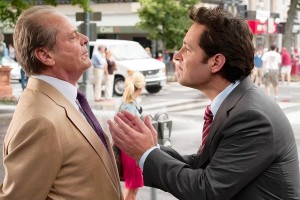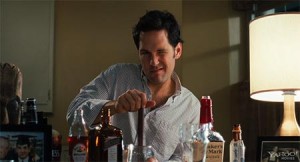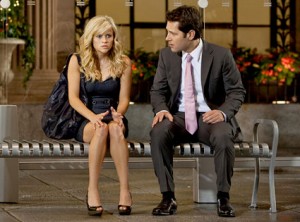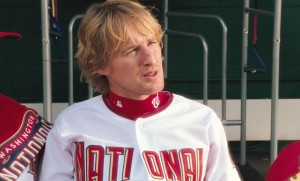How Do You Know
 A visual motif is supposed to be used to express a feeling that is never overtly expressed by the characters, revealing something about them that they’re unaware of or trying to hide. A perfect example is Tammy Metzler in the movie Election, and the use of garbage that she either hides behind or hangs out near. Tammy tries to sabotage the school president election by encouraging the student body to vote for her because her first order of business would be to dismantle the student government. She also offer the suggestion that they not vote at all. Tammy does all of this to get back at her brother who is now sleeping with Tammy’s Sapphic crush Lisa. Tammy isn’t confused by her own lesbianism but Lisa made her feel ashamed for her honest emotions, and so Tammy views herself as an outcast, trashy by the standards of her upper middle class community.
A visual motif is supposed to be used to express a feeling that is never overtly expressed by the characters, revealing something about them that they’re unaware of or trying to hide. A perfect example is Tammy Metzler in the movie Election, and the use of garbage that she either hides behind or hangs out near. Tammy tries to sabotage the school president election by encouraging the student body to vote for her because her first order of business would be to dismantle the student government. She also offer the suggestion that they not vote at all. Tammy does all of this to get back at her brother who is now sleeping with Tammy’s Sapphic crush Lisa. Tammy isn’t confused by her own lesbianism but Lisa made her feel ashamed for her honest emotions, and so Tammy views herself as an outcast, trashy by the standards of her upper middle class community.
 The use of garbage perfectly exemplifies Tammy’s personal worth, but I have no idea what the meaning of Paul Rudd and Owen Wilson’s characters in James L. Brooks’ How Do You Know seeming obsession with very elaborate alcoholic drinks, of the bendy straw tradition. Sure, Rudd and Wilson are both courting aging softball player Reese Witherspoon (aging by the sport’s tradition, but also too skinny for it), and there’s supposed to be a symmetry going on. But Brooks pairs up plenty of other incidents, two different female characters raise their hands to uncharacteristically hit male characters arrogantly spouting off, two characters, Wilson and Rudd’s father, played by Jack Nicholson, inexplicably live in the same building (as if rich people in Philadelphia, where the movie was shot, all lived in the same building), setting up unfulfilled farcial elements, and most egregiously, everyone in the movie talks in self-help “wisdom.”
The use of garbage perfectly exemplifies Tammy’s personal worth, but I have no idea what the meaning of Paul Rudd and Owen Wilson’s characters in James L. Brooks’ How Do You Know seeming obsession with very elaborate alcoholic drinks, of the bendy straw tradition. Sure, Rudd and Wilson are both courting aging softball player Reese Witherspoon (aging by the sport’s tradition, but also too skinny for it), and there’s supposed to be a symmetry going on. But Brooks pairs up plenty of other incidents, two different female characters raise their hands to uncharacteristically hit male characters arrogantly spouting off, two characters, Wilson and Rudd’s father, played by Jack Nicholson, inexplicably live in the same building (as if rich people in Philadelphia, where the movie was shot, all lived in the same building), setting up unfulfilled farcial elements, and most egregiously, everyone in the movie talks in self-help “wisdom.”
 If anything, Brooks was more interested in these mantras as whole conversations in the movie are made up of such nonsense, to the point where the characters are simply robots who spout therapeutic gibberish. It overshadows what Brooks (Broadcast News, As Good As it Gets, Terms of Endearment) does so well, which is sprinkle his overlong films with genuine wit, instead of here, where everyone’s lives are lived in theory and metaphor. Rudd, being sued by the government for financial misdeeds in Nicholson’s company, gets off a number of good lines, such as when he tries to avoid souring his mood and asks his father, “are you going to make me run from bad news?” Wilson, playing a heel baseball player, offers so much honesty that he tells Witherspoon that “I can’t trust myself not to manipulate you,” and whenever he’s kind, looks alarmed that he’s not behaving like a cad.
If anything, Brooks was more interested in these mantras as whole conversations in the movie are made up of such nonsense, to the point where the characters are simply robots who spout therapeutic gibberish. It overshadows what Brooks (Broadcast News, As Good As it Gets, Terms of Endearment) does so well, which is sprinkle his overlong films with genuine wit, instead of here, where everyone’s lives are lived in theory and metaphor. Rudd, being sued by the government for financial misdeeds in Nicholson’s company, gets off a number of good lines, such as when he tries to avoid souring his mood and asks his father, “are you going to make me run from bad news?” Wilson, playing a heel baseball player, offers so much honesty that he tells Witherspoon that “I can’t trust myself not to manipulate you,” and whenever he’s kind, looks alarmed that he’s not behaving like a cad.
But it’s all overwhelmed with this Mad Libs of psychobabble, with Witherspoon, Wilson, Nicholson, and Rudd all either stating outright or offering variations on the notion of “I fought myself.” Yes, there’s an element of the film about frustration with one’s own inertia and impotence. And there’s the presentation of Nicholson’s character as a man aware that his time is valuable precisely because it’s running out. Brooks even tickles us with the notion that aging isn’t just about accepting our own mortality, but narrowing our range of what we accept. But then all that goes down the drain as soon as the all-knowing wisecracking doorman character* is introduced, positing us in sitcom land (Brooks produced Taxi and The Mary Tyler Moore Show).
 Brooks’ instincts are so questionable throughout How Do You Know that he forgets to lay out seemingly important details. For about an hour, it seems like Owen Wilson is a baseball agent, and part of his interest in Witherspoon (she of the Aniston-ian potato chin) is professional, and that’s why he’s conflicted about treating her like a fling, instead of with respect. It’s emblematic of these issues that Tony Shalhoub, sporting his Men in Black ears, shows up as a therapist, who at least would be a conduit for all the psychiatric masturbation, leaves a minute later. Nothing he says or does is funny or relevant, and so it just comes across as strange that you’d cast a recognizable actor in such a part, unless, and this is likely, most of Shalhoub’s part was cut for time.
Brooks’ instincts are so questionable throughout How Do You Know that he forgets to lay out seemingly important details. For about an hour, it seems like Owen Wilson is a baseball agent, and part of his interest in Witherspoon (she of the Aniston-ian potato chin) is professional, and that’s why he’s conflicted about treating her like a fling, instead of with respect. It’s emblematic of these issues that Tony Shalhoub, sporting his Men in Black ears, shows up as a therapist, who at least would be a conduit for all the psychiatric masturbation, leaves a minute later. Nothing he says or does is funny or relevant, and so it just comes across as strange that you’d cast a recognizable actor in such a part, unless, and this is likely, most of Shalhoub’s part was cut for time.
What’s odd is how much How Do You Know resembles a movie that Brooks produced, Cameron Crowe’s Say Anything. Both feature a blandly handsome guy (Cusack, Rudd) dealing with the legally suspicious activity of a single father (John Mahoney, Nicholson) while in pursuit of a women whom he perceives as out of his league. In both cases, the criminal proceedings are nothing more than ill-advised, contrived obstacles to bring the lovers together, since nothing they do or say would naturally end in a relationship. Say Anything was Crowe’s first directing job, so a misstep is acceptable, even if it makes you wince. Brooks is a veteran filmmaker, so he has no excuse for the fact that How Do You Know? is so confused.
 * The wise doorman character is so hacky that it echoes a fictional part that Bruce Campbell wrote about in Make Love the Bruce Campbell Way. The role was of Richard Gere’s practically omniscient doorman in an overpriced [fake] Mike Nichols movie. The differences between Nichols and Brooks, both formerly hip, old fogey, filmmakers desperate to remain relevant, is not so great.
* The wise doorman character is so hacky that it echoes a fictional part that Bruce Campbell wrote about in Make Love the Bruce Campbell Way. The role was of Richard Gere’s practically omniscient doorman in an overpriced [fake] Mike Nichols movie. The differences between Nichols and Brooks, both formerly hip, old fogey, filmmakers desperate to remain relevant, is not so great.



